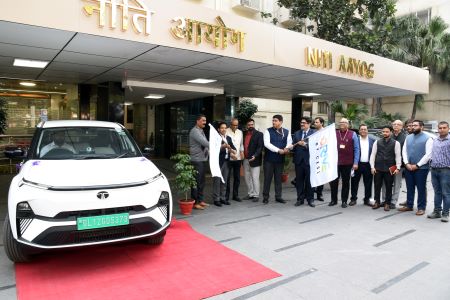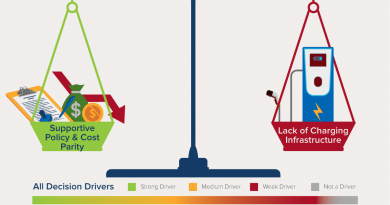CESL deploys 20 new e-cars at NITI Aayog under ‘EV as a Service’
With this, total 35 E-Cars now at NITI Aayog by CESL and EESL, marking a key milestone in empowering clean mobility in the government fleet.

To bolster the green mobility spree in the country, 20 electric cars were flagged at NITI Aayog by the CESL – a subsidiary of Energy Efficiency Services Limited (EESL).
The flagging off ceremony was attended by Sudhendu Sinha, Advisor, Infrastructure Connectivity & Electric Mobility, NITI Aayog, KS Rejimon, Joint Secretary – Administration, NITI Aayog, Vishal Kapoor, MD & CEO, CESL and Rajneesh Rana, Head (Convergence), CESL.
CESL operates under the Ministry of Power and is spearheading this ‘EV as a Service’ initiative. Under this initiative, New E-Cars are deployed with end-to-end solution including repair & maintenance, while complying with all the rules and regulations related to Motor Vehicle Act, Workmen/Driver/Labour Laws, Make-In-India, GFR guidelines, etc.
There is no upfront cost from the beneficiary and lease payments are made on a monthly basis for a period upto 5 years.
Speaking on the occasion, MD & CEO of CESL, Vishal Kapoor stated, “CESL is proud to have been spearheading Govt. of India’s vision to promote adoption of sustainable mobility solutions in Govt. fleets. Through initiatives like ‘EV as a Service,’ we are ensuring a seamless transition from ICE to electric vehicles, reducing dependence on fossil fuels, and facilitating government departments to switch to green mobility.”
With this, CESL has now deployed about 2200 e-cars across various Central Govt., State Govt. and CPSE’s across India. Further, it has set a target to deploy 5000 nos. of E-Cars in Govt. fleets in the next two years, in order to support the vision of 30% EVs by 2030.
CESL is also working towards enabling battery-powered electric mobility and its infrastructure and design business models to increase the uptake of electric vehicles in India. It claims to employ unique business models, Convergence is utilizing a blend of concessional and commercial capital, carbon finance and grants as appropriate to enable commercialization of these solutions at scale.




